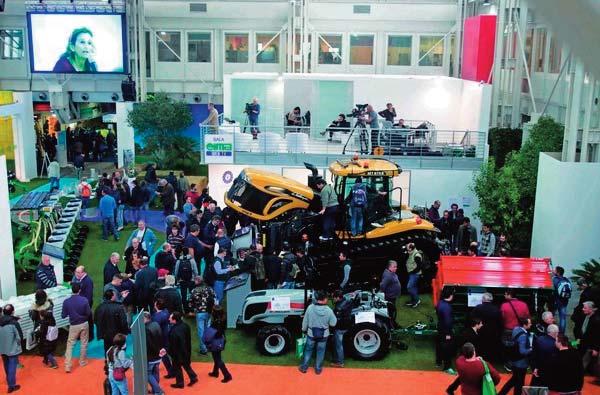
2 minute read
EIMA International 2022: green and Mediterranean
The next edition of the international exhibition of agricultural machinery, which takes place in Bologna from 9 to 13 November, was presented in Foggia. Big event numbers and growing participation. The “Green” exhibition dedicated to machinery and equipment for gardening and landscaping was confirmed, and will also include a demo section. Conferences and seminars focusing on specialised crops and the agricultural economy of the Mediterranean area are in the pipeline.
The EIMA agricultural machinery exhibition – to be held in Bologna from 9 to 13 November – is the most important event of the year at the international level for agricultural companies, business operators and agro-mechanics technicians. It is also an important appointment for the world of gardening, landscaping, urban decoration and sports facilities. Indeed, the EIMA Green exhibition, held as part of the agricultural machinery show, offers a wide range of technologies for green maintenance. It is also aimed at multifunctional farms, municipal administrations, green designers and the vast public of hobbyists who tend gardens and small farms.
Advertisement
The 2022 edition of EIMA Green was presented this morning in Foggia by Simona Rapastella, Director General of FederUnacoma, the association of agricultural machinery manufacturers that is the direct organiser of the Bologna-based exhibition, during a press conference held at the Ricciotti Nurseries as part of the “Demo Green” demonstration trials. “With next autumn’s edition,” noted Rapastella, “the great Bologna event will return to its natural scheduling, in November of even-numbered years, after the date changes of recent years imposed by the health emergency.
The 2022 edition promises to be very rich. To date, more than 1,200 manufacturers (including over 300 from abroad) have confirmed their participation, with a demand for exhibition space that has already exceeded a net 110 thousand square metres. In the weeks to come, many more registrations are expected, to complete the 14 specialised sectors and 5 themed shows into which the exhibition is divided (“Components” dedicated to components, “Digital” dedicated to 4.0 technologies and robotics, “Energy” centred on bio- energy supply chains, “Idrotech” specialised in irrigation and water management systems, and “Green” for the gardening sector).
“The programme of EIMA International this year includes an important novelty,” said the Director General of FederUnacoma, “namely the ‘preview’ of the Technical Innovations, i.e., a day at the end of September in Bologna entirely dedicated to the description and awarding of the winning machines of the competition reserved for models that present highly innovative new systems at EIMA”. A further novelty at this edition concerns the green sector and consists in the demonstration trials of specific gardening vehicles that will be organised inside the Bologna exhibition centre, alongside the traditional trials of vehicles for bioenergy chains and the show of the tractor finalists of the Tractor of the Year competition, which made its debut in the October 2021 edition and is confirmed this year in the arena set up with a large grandstand and a natural green setting.
In addition to the technical content, the cultural content of the event is also expected to be very rich, confirming the EIMA Campus initiative dedicated to Universities and research bodies and envisaging no less than 140 conferences and seminars on topical issues regarding agromechanical processing and above all national and European policies for the development of mechanisation. “Particular attention will be devoted to themes relating to the Mediterranean area,” stressed Simona Rapastella, “especially to technologies for specialised crops, systems for optimised management of water resources, and specific mechanical means for agriculture on the islands, and this underlines how EIMA International is the reference event not only for large ‘open field’ productions, but also for specialised and niche ones that have greater added value and have become increasingly important in the agricultural economy of our South and the entire Mediterranean area in recent years”.








